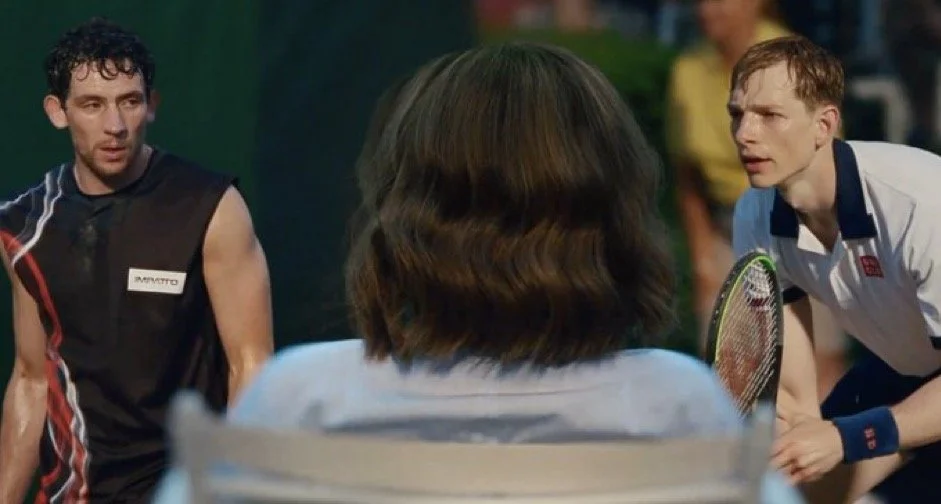‘Challengers’ Review: A Love Game
Mike Faist, Zendaya, and Josh O’Connor in Challengers. Courtesy of MGM.
Tennis complicates matters related to love. Luca Guadagnino’s latest film, Challengers, places Tashi Duncan, Art Donaldson, and Patrick Zweig in a 13 year match set at a score of zero-zero, with the tennis phenom’s ‘little white boys’ competing for her love, which only resides in the game.
Trent Reznor and Atticus Ross’ sexual and sense-stimulating score adds a pulse and rush of adrenaline to the film, creating a sense of urgency for the high stakes with each competitively manipulative rally of emotion and betrayal manifested into physical form by a green ball. Not to be understated is the potential for the score to be the next irresistibly hip-shaking club anthem beyond its principal purpose of driving the story through sound.
The slow ascension to the 2019 New Rochelle Challenger match between Art and Patrick, which opens the film, is excruciatingly painful to wait for, but worth the wait in a perfectly executed and satisfying third ‘set’. With a narrative timeline shifting back and forth from the origins of the three-turned-love triangle to the tortuous implications of their lives remaining intertwined, the film enters the minds of the characters, who remain self-defined and shaped by the past.
Love means nothing in tennis, and even less to Tashi Duncan in her relationships with Art and Patrick, playing a game where the ball is hers to serve. With footwork that made a tennis player in the audience exclaim her potential to actually play in real life, Zendaya commands the screen from the moment we and the two challengers meet Tashi at the ‘06 US Open. Eagerly exchanging turns for kisses in a hotel room fully under the control of Tashi escalates into years-long puppeteering and cunning edging that shatters the partnership of Art and Patrick. Fiercely relentless and imbued with graceful confidence, Duncan becomes tennis's best friend as two opposing players vie for her gaze.
Following a torturous argument between Tashi and Patrick, then a young couple, the delighted Art (who succeeded in his mission to divide the two) places his hand on the chair reserved for Patrick, ushering Tashi to the side of her career-ending injury and into the role of her unreciprocated lover. Tashi painfully shifts from the role of player to coach, investing in Art’s game and shaping the presently-married couple as game changers in the tennis world.
Mike Faist portrays Art Donaldson with longing glances and eyes seeking approval, revealing the character’s desire not for winning the game but Tashi. Realizing that he’s a part of her ‘fan club'—and may possibly be the most devoted member—Tashi allows Art to exist in her world as a vessel for their collective wins. She is Jesus to Art, and he is a dutiful disciple that never meets her eye, intentionally positioned below her in every frame of Challengers, subservient, and at her will. Who Art is to Tashi if not for tennis is nothing, and his awareness of the game being their only true connection causes him to stay long after his passion fades.
Josh O’Connor owns the film, embodying desperation masked by an inherent suaveness in Patrick Zweig, the ‘oddball’ of the trio, who is immediately distinct through a singularly unusual serve and his stagnant life trajectory. Patrick’s ability to understand Tashi’s mind games enables him to confidently stand tall and challenge her stature, viewing himself as a peer who is owed respect regardless of the lack of accolades attached to his name. An unchanged man who resorts to destructive old habits and has full awareness of his bad-boy behavior almost entices you to wish the worst for the character. Yet, O’Connor’s mastery of humanizing morally challenged characters results in Patrick Zweig’s annoyingly irresistible likability alongside a smirk that ascends the film to a grand slam. Both men satisfy the duality of Tashi’s lustful longings: one defining his identity in her desires, and another whose attractiveness stems from a dirtiness-free refusal to live out her blueprint.
Under the lens of cinematographer Sayombhu Mukdeeprom, the swift movement of the camera left-to-right during matches on and off the court mimics the raw speed and motion of the ball as it flies above the net. The stillness of the camera during pivotal moments in the film highlights the physical acting and calculated body movement that supersede dialogue within the film. The exclusive language of tennis is most impactful during the final match between Art and Patrick, who communicate through expressive grunts, old signals, and gazes to Tashi for her nod of recognition. Whether words or rackets are being flung around, the vibrancy of color and movement make Challengers a stylish, intentional, and electric film.
Tashi is positioned as the net in between Art and Patrick during the final moments of Challengers, in a love game of endless hard-hitting rallies.
Now Playing Only in Theaters.

